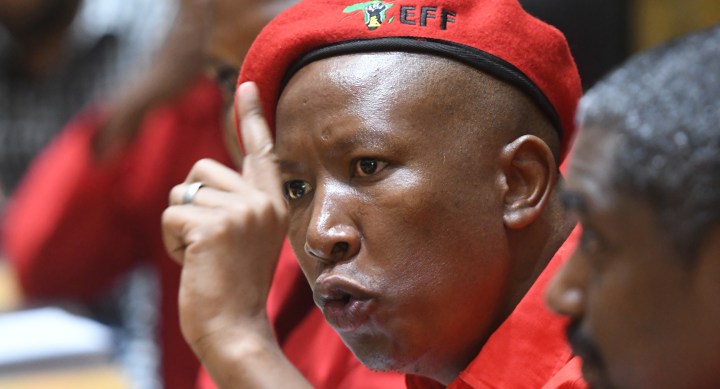Road to Elections 2019
EFF takes manifesto meeting to the financial sector

On Friday, the Economic Freedom Fighters hosted the second of a series of Public Manifesto Consultative meetings, this time in Bryanston, to meet members of the financial sector in Bryanston ahead of the 2019 National Elections.
Friday’s meeting saw EFF national chairperson Dali Mpofu, national spokesperson Mbuyiseni Ndlovu and Commander-in-Chief Julius Malema and several other EFF officials trying to find out what the financial sector expects from a government that the EFF is campaigning to run in 2019.
The day before, the EFF hosted the first of its consultative meetings in Orlando with elderly members of the community, who raised concerns over lack of land tenure, title deeds and social security grant issues.
“These meetings are meant to be engagement meetings, they are not meant to be a mass meeting. They are designed for maximum participation,” said Mpofu at the Bryanston meeting.
“Over the next six months the EFF will tour the country to meet citizens and ask them, to engage with us and find out what are the burning issues in their sector and what issues they would like us to address post-election,” continued Mpofu.
And since the EFF had already proven that it can make things happen even as a minority, Mpofu said that it would be better if they were in power, and therefore needed people to vote for the party.
He went on to encourage members of the audience to highlight issues that affected them in a frank discussion, without holding back.
“Even if you attack and we would become defensive, don’t worry, we have listened; when we are alone we will say ‘hey those people are saying something’,” said Mpofu.
Ndlozi encouraged audience participation and opened multiple rounds of discussion.
For Ndivhuwo Makuba, director of risk management at Liberty Life, the biggest issue within her sector had been a lack of transformation in leadership. And although she makes an effort to hire black people under her, there is still a glass ceiling at the top.
Kgomotso Ramothibe, a banker for Barclays Bank concurred with Makuba. Furthermore, she discounted the popular notion that South Africa had an unemployment problem.
“We have an influx of experts,” said Ramothibe. Whenever she tried to raise the issue of employing local people with the bank’s leadership, she was told about rare skills, even though the skills required could be sourced in South Africa, she said.
She said a transformation committee had been set up at her work, but had not achieved any of its targets.
“Black people are suffocating in the financial space, a place where they feel unwanted,” said Ramothibe.
Thandanani Msibi, Group CEO of Numsa Investment Company, said the financial sector accounted for 20% of GDP, whereas mining only accounted for 8%. And at the top of the financial sector are retirement funds.
Although black people own a significant part of retirement funds, they do not have power over them.
“The centre of gravity of the economy is the financial sector, and the centre of gravity of the financial sector is the retirement funds,” said Msibi.
Given Phaladi of Regive Capital said retirement funds within state-owned enterprises also needed transformation and more regulation. Over the years, the Prasa retirement fund, Transnet Retirement fund and others had employed a 50/50 representative policy in the Board of Trustees.
However, since unions represented the employees on the board, they were supposed to facilitate transformation, yet ended up enriching themselves as they were in the pocket of top executives.
“Are unions the right people to represent employees on the boards?” asked Phaladi.
Bernard Agulhas, CEO of the Independent Regulatory Board for Auditors (IRBA), said their main responsibility was to protect investors by strengthening the independence of auditors from their clients.
In order to break this “cosy relationship” and “do away with the old boys club that has existed for many years” IRBA sought to introduce a mandatory rotation policy to give mobility and access to smaller black firms and break the concentration of the big four in that market.
This policy, which would have addressed the lack of competition and also driven transformation in the sector, was met with a lot of resistance. Agulhas wanted the EFF to look into giving the IRBA more power to enforce and implement its policy, as the current system was not working.
Another common concern was the oncoming fourth industrial revolution and how technology would change the nature of work and lead to more unemployment.
After two hours of comments from the audience, Malema thanked people for the robust discussion as the EFF formulated its manifesto for 2019 elections.
According to Malema, neglecting the financial sector would be like neglecting the entire economy. “It is important to listen to those who know the sector very well,” he said.
Malema went on to dispute the notion that machines were going to take people’s jobs. According to the EFF leader, if machines take jobs, who is going to consume the products and where will they get resources to purchase these things?
The solution is in finding ways to protect jobs and re-skill people.
For this to be achieved, Malema said the country needed leadership that was not afraid of the status quo.
Just as in the land debate, “when we spoke about land many people spoke about not scaring the investors, and now it is investors who are participating” in how best to expropriate, said Malema.
“We must disrupt the financial sector, because without any disruption, it will not be transformed,” said Malema. DM


















